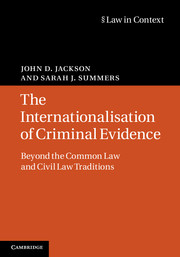Preface and acknowledgements
Published online by Cambridge University Press: 05 June 2012
Summary
Although the law of evidence has traditionally been treated as a common law subject confined to national borders, there has been a growing awareness across the common law and civil law world about the need for different systems to adopt common approaches towards criminal evidence as national systems cooperate with each other to combat transnational crime. The subject is also attracting growing recognition in international human rights law as bodies such as the European Court of Human Rights (ECtHR) have begun to develop common evidentiary standards to be applied across national boundaries. At the same time, the conflicts that led to grave crimes against humanity in the Balkans, Rwanda and other conflict zones have compelled the international community to bring those responsible to justice by developing systems of procedure and evidence that are acceptable across different legal traditions.
This book examines these attempts to find common approaches towards issues of criminal evidence across different national boundaries and legal traditions. Each of us has been following these developments for some time. As a teacher of the law of evidence at Queen's University Belfast John Jackson became interested in them as he witnessed the impact that the ECtHR was having on common law systems of evidence. Sarah Summers began to become interested in criminal evidence when she was working on her published doctoral thesis on the development of fair trials rights in Europe. Although originally from Scotland, she presently teaches criminal law and procedure at the University of Zurich. We decided to bring our experience of common law and civil law jurisdictions together to examine the evolution of common evidentiary standards in Europe and in the international criminal tribunals. We have tried to reflect case law and other legal developments up to the end of December 2010.
- Type
- Chapter
- Information
- The Internationalisation of Criminal EvidenceBeyond the Common Law and Civil Law Traditions, pp. xvi - xviiiPublisher: Cambridge University PressPrint publication year: 2012

